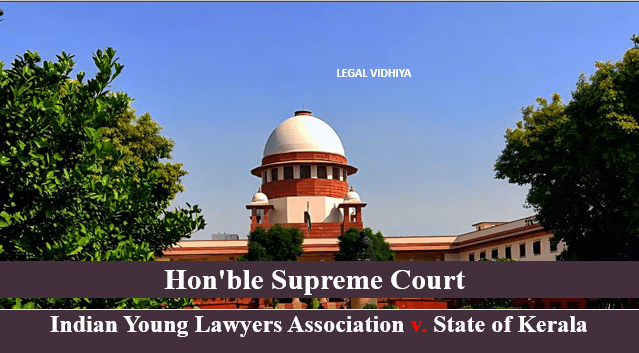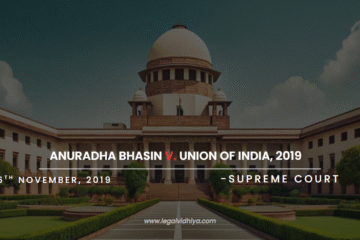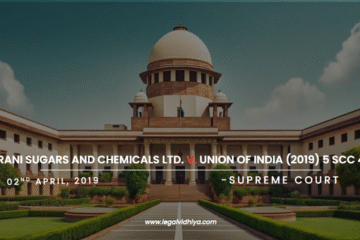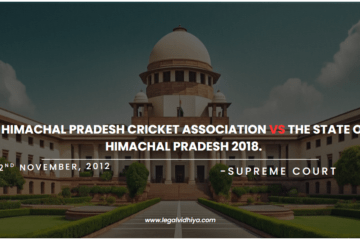
| CITATION | 2018 SCC OnLine SC 1690 |
| DATE OF JUDGMENT | 29th September 2018 |
| COURT | Supreme Court India |
| APPELLANT | Indian Young Lawyers Association |
| RESPONDENT | State of Kerala |
| BENCH | Justices Dipak Misra, A.M. Khanwilkar, Rohinton Fali Nariman, Dr. D.Y. Chandrachud and Indu Malhotra. |
INTRODUCTION
The Indian Young Lawyers Association brought the matter before the Honourable Supreme Court of India in 2006 as part of a public interest lawsuit. In this scenario, “Entry of Women in Sabarimala Temple” is a significant issue. There were numerous arguments brought up in which petitioners claimed that regulations relating to the prohibition of women’s admission into temples were illegal since they violated Articles 14, 15, 17, 25, and 26 of the Indian Constitution. amid Kerala’s Pathanamthitta District’s western ghat mountain ranges, amid the Periyar Tiger Reserve, is where you’ll find the Sabarimala Temple. The Lord Ayyappa is revered in this temple. Women who are between the ages of 10 to 50 yrs and menstruation are prohibited from entering.
FACTS OF THE CASE
In the State of Kerala, there is a Hindu shrine called Sabarimala shrine that is devoted to Ayyappan. It is a temple that may be found in Kerala’s “Pathanamthitta” district at Sabarimala, which is part of the Periyar Tiger Reserve. One of Kerala’s most well-known temples, the Sabarimala shrine, has access restrictions for women (of menstrual age).
Many ladies attempted to enter the Temple but were prevented from doing so due to threats of physical abuse. Five female lawyers filed a petition with the Supreme Court to overturn the Kerala High Court’s ruling upholding the long-standing limitation and declaring that only the “Tantrik (Priest)” has the authority to make decisions regarding customs.
ISSUE RAISED
- Whether the exclusionary practice which is based upon a biological factor exclusive to the female gender amounts to “discrimination” and thereby violets the very core of Article 14, Article 15 and Article 17 and protected by “morality” as used in Article 25 and Article 26[6] of the constitution.
- Whether this restriction violates the provisions of Kerala Hindu Place of Public Worship Act, 1965?
- Whether the Sabarimala Temple has a denominational character?
CONTENTIONS OF APPELANT
- It was argued that as the practice is limited to females aged between 10 and 50 years, it results in discrimination against women as a class.
- It was argued that this practice, which is solely gender-based, violates Articles 15(1) and 15(2)(b). Given that the classification lacks a constitutional purpose, this tradition violates article 14 of the Constitution. Additionally, it offends the freedom of religion for everyone. Women’s menstrual cycles are not constant, thus permanently outlawing them would be unconstitutional.
- It is argued that Lord Ayyappa does not have a specific religious denomination; the name or minor variations in rituals do not permit the followers to belong to a different religious group. Additionally, the prohibition on women is unquestionably not a fundamental religious practice, it is unnecessary, and it violates Articles 21 and 17 if followers of Lord Ayyappa create a religious organization.
CONTENTIONS OF RESPONDENT
- It was argued that the language used in Article 25(2)(b) indicates that caste-based discrimination is not acceptable.
- It is said that females under the age of 10 and older can enter any temple without restriction and enjoy their right to worship, but this restriction is not based on discrimination because it is necessary to preserve the purity of this particular temple, i.e. Naishtik Brahmachari. They are permitted to visit additional Lord Ayyappa temples. Since the customs have been followed without interference for all time, they are lawful in accordance with Art. 13(3)(b). Furthermore, the restriction is justified because the presence of women may divert the attention of the men.
- In S. Mahendran v. The Secretary, Travancore Devaswom Board and Ors., the Kerala high court decided that Lord Ayyappa is now regarded as a religious denomination. Additionally, it is argued that the primary goal of Art. 17 is to outlaw caste-based untouchability in the Hindu faith, and that this practice is not practiced inside the temple.
JUDGEMENT
By a 4:1 majority, the court ruled in this case on September 28, 2018, finding that the practice breached Articles 14, 15, 19(1), 21, and 25(1), which protect the fundamental rights to equality, liberty, and freedom of religion. Rule 3(b) of the Kerala Hindu Places of Public Worship Act was declared unconstitutional and was thus overturned. Hindu denominations were permitted to bar women from visiting public places of worship if their decision was supported by custom under Rule 3(b).
The supreme court declared that “Devotion cannot be subjected to Gender Discrimination” and permitted entrance to women of all ages to the Sabarimala Temple.
CONCLUSION
In a nation like India, religious freedoms are crucial components for the democracy’s proper operation. As much as it is possible for the constitution’s aspirations and social reality to diverge, society functions best when both are working properly. Indian Young Lawyers Association v. State of Kerala & Ors. is a case in which the Supreme Court has tried to reconcile constitutional objectives with social reality.
REFERENCE
This Article is written by Prazzal Mohanty student of SOA National Institute of Law, BBSR; Intern at Legal Vidhiya.




0 Comments